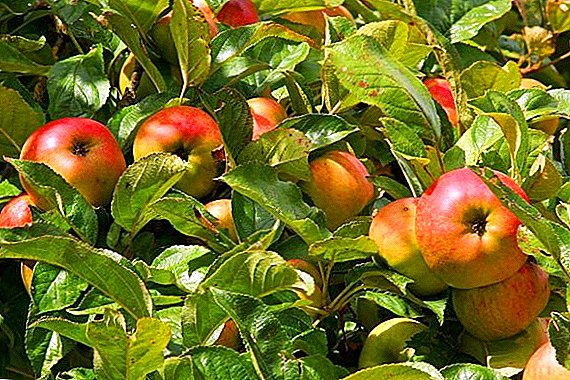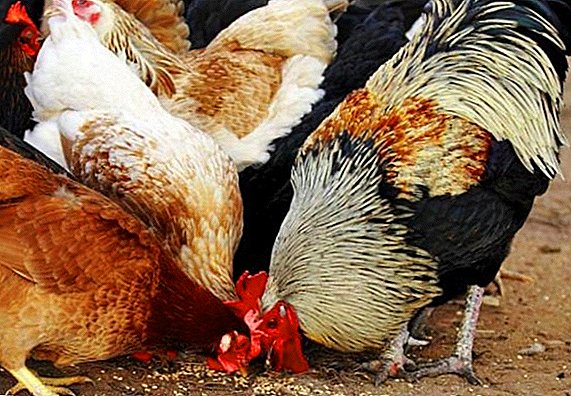 Enemy need to know in person. Of course, chicken lice are too small to see their faces, so let's first try to understand what it is. Having dealt with the parasites and why they appear, you can get rid of them by a number of proven methods.
Enemy need to know in person. Of course, chicken lice are too small to see their faces, so let's first try to understand what it is. Having dealt with the parasites and why they appear, you can get rid of them by a number of proven methods.
How to detect lice in a chicken coop
Chicken lice are called parasites, which belong to the puff-eating (the correct name is Malofagi). So they are named because they feed on the down and feathers of the host on which they live. Also, do not disdain and withered skin. To detect them is problematic, since the size of one individual does not exceed 2 mm.
Read more about why chickens go bald.
The body is an elongated oval yellow-brown color, divided into segments by dark stripes or spots. The diameter of the head is slightly larger than the body, the presence of antennae and six paws with claws, which allow them to stay on the host, are also noted.
Important! One sexually mature pair of malophages gives 90-100 thousand eggs. Thus, in less than a month, their number increases to a huge number. It is because of the high rate of reproduction that it is necessary to take measures to eliminate the parasites immediately after their detection.

Females' light eggs can glue to down, feathers and body. Eggs are oval, and best of all they can be seen with a magnifying glass. No more than 18 days is necessary for the larva to become similar to an adult. They become sexually mature after they shed their skin three times. For this they need no more than three weeks.
We advise you to read about how to get rid of ticks, worms, fleas and peroeda in chickens.
The main signs that lice are bred in the hen house:
- Chickens are nervous, harm themselves (pluck feathers in an attempt to catch the parasites).
- Marked loss of appetite.
- Massive bird weight loss.
- Birds carry eggs in much smaller quantities.
- At the plumage holes appear (so the parasites gnaw their way).
- The young grow slowly.
- Irritation appears on the skin around the eyes.
- Birds can not fully sleep.
If you notice one or more reasons from the list - it's time if you do not sound the alarm, then at least find out if the birds have lice. 
Causes of lice
Experts say that Malofagi feel best of all warm. Temperature from +25 to +30 ° С is optimal for them. If at the same time there is also moisture at the level of up to 78%, such conditions for their vital activity become ideal.
Learn more about chicken diseases and how to treat them.
Given the above, we highlight the main causes of infection with chicken lice:
- dirt (if the chicken coop is not properly cleaned, the risk of catching parasites increases);
- narrowness (the closer the birds are to each other, the lice easier to move from one host to another);
- contact with infected birds (this may be not only chickens, but also a sparrow, a crow or a dove, with which an individual could come into contact during a walk);
- low immunity (from poor nutrition and inadequate conditions of detention);
- rodents (they carry a lot of different infections, including lice).

Did you know? As a rule, roosters suffer from these insects much more than chickens. The reason for this is that male individuals are concerned about hygiene to a much lesser extent, which is why they are more appetizing prey for lice.
If your birds are kept according to the rules, are limited from contact with sick animals, the risk of infection is minimal.
Are chicken lice dangerous to humans?
For humans, chicken lice are a little dangerous:
- they do not feed on blood, especially human;
- due to differences in the structure of feathers and hair, even if the parasite gets there, shampoo will deal with it easily and quickly.
Although not so rosy. A person can not feel safe at 100%, because the lice bite, and quite painful. In addition, there are confirmed cases of allergies to such bites. 
This is not to mention the fact that malophagi, like many parasites, are carriers of every kind of infection, for example:
- encephalitis;
- salmonellosis;
- brucellosis;
- worms.
Popular methods of dealing with lice
There are a number of drugs that can be derived Malofagov. In private farms they are not always at hand. In addition, with such tools should be extremely careful, because they not only destroy the parasites, but also can harm both birds and humans.
Let's consider the best folk remedies that are as safe as possible for everyone except lice.  It is worth remembering that when breeding these parasites need to act on two fronts:
It is worth remembering that when breeding these parasites need to act on two fronts:
- the first is the processing of the birds themselves. The earlier the better. In addition, the entire chicken coop should be processed simultaneously, since one infected individual is enough for everyone to be amazed again;
Did you know? In the Middle Ages, hygiene was at a very pitiable level. In Europe, human head lice wore the poetic name "God's pearls", as they were filled with the blood of Christians. Thus, in Sweden, elections for public office were held with the help of a single louse. It was believed that on whose beard an insect climbed, that being the next burgomaster.
- and the second is a thorough processing of the coop. Although lice and lead a parasitic way of life, but outside the host they can live up to four, and in some cases up to eight days.
- Free the chicken coop from livestock. All birds, without exception, must be transferred to another place.
- It is worth starting with the root cause, namely the dirt. It is necessary to ideally clean the chicken coop from trash and waste products of birds.
- You also need to process each bird separately. Here we look at the options that traditional medicine offers us, because insecticides are dangerous to humans and birds.
Carefully sticking to all these steps is necessary, so the slightest mistake can offset all efforts, and you have to start all over again.
Using kerosene
Kerosene - the first assistant in the fight against chicken lice. Due to the fact that it is safe for poultry, it is possible and necessary to process the chicken coop with kerosene. This should be done at least once a week. In addition, they can handle the feathers of birds. The effect of kerosene on malofgov is that it kills adult individuals.  As for the larvae, here its action is directed to their chitin (the protective membrane of the lice larvae). If it is destroyed, the larva dies. And yet, when treating poultry with kerosene, one must be careful not to hurt badly damaged skin areas (wounds), if any.
As for the larvae, here its action is directed to their chitin (the protective membrane of the lice larvae). If it is destroyed, the larva dies. And yet, when treating poultry with kerosene, one must be careful not to hurt badly damaged skin areas (wounds), if any.
With vinegar
The indisputable big plus of using vinegar is its smell. It is unbearable for lice. We should not use pure vinegar so as not to damage the skin of birds. Dilute the vinegar with water in a 1: 2 ratio.
This solution can be treated and the chicken coop, and each bird separately. Of course, it is necessary to ensure that the solution does not fall on the mucous birds and the one who is engaged in processing.
Scaring off with ammonia and kerosene
Ammonia - two in one. The chemical composition acts directly on malophages.  In addition, the smell they do not like the same as the smell of vinegar. They do not use liquid ammonia, only in a mixture with kerosene. Processing is carried out in the same way as in the previous case.
In addition, the smell they do not like the same as the smell of vinegar. They do not use liquid ammonia, only in a mixture with kerosene. Processing is carried out in the same way as in the previous case.
It will be useful for you to read about how to choose a chicken coop when buying, how to make a chicken coop from a greenhouse, how to equip it, how to make ventilation in the coop, and how best to heat the coop in winter.
Sand ash baths
If you mix sand and ash in a ratio of 1: 1, we will not get a pungent pungent smell. However, if you put a container with such filling in the chicken coop, the birds will be happy to take such a bath on their own, which helps to remove lice. The simplest and safest method against lice, but more time than previous options. 
With the help of herbs
The safest thing for chickens is to use herbs or their oils. Here wormwood, wild rosemary, tansy, rosemary, needles and mild spices are suitable. After careful cleaning of the chicken coop, it will be enough just to scatter such herbs on it.
As herbs for the chicken coop, plants such as celandine, burdock, jaundice, hemlock, elder, horse chestnut and hellebore cannot be used, because they are dangerous to chickens.
Their smell will deter lice, but will not cause any harm to birds. The method is also more prophylactic due to its mild effect.
Please note that any method requires mandatory thorough cleaning of the chicken coop. And now let's consider what needs to be done to prevent the appearance of chicken lice in the economy. 
Lice Prevention Policy
After the problems with parasites have been solved, it is worth taking a series of measures to prevent their possible subsequent appearance.
- Carefully inspect the chicken coop. If you see holes made by rats or mice, they should be immediately repaired to prevent chickens from contacting rodents.
- Above the place where the birds walk, you have to tighten the net to reduce the risk of transmitting lice from sparrows, crows or pigeons.
- Your hen house should always be clean. In no case should it be allowed to pollute it.
- Space - birds can not be cramped. Therefore, you should, as far as possible, increase their place of permanent residence.
- The herbs will not only scare the lice, but also give the chicken coop a more aesthetic smell.
- Regular inspection. The sooner a problem is detected, the faster it will be fixed. And this is a guarantee of the safety of chickens, which means their eggs and meat.

Thus, the cleanliness and timely care of the bird will help avoid the hassle of exterminating tenacious insects and diseases of birds. Do not forget that it is better to prevent the occurrence of these insects than to subsequently save their birds from this scourge.
Reviews from the network














